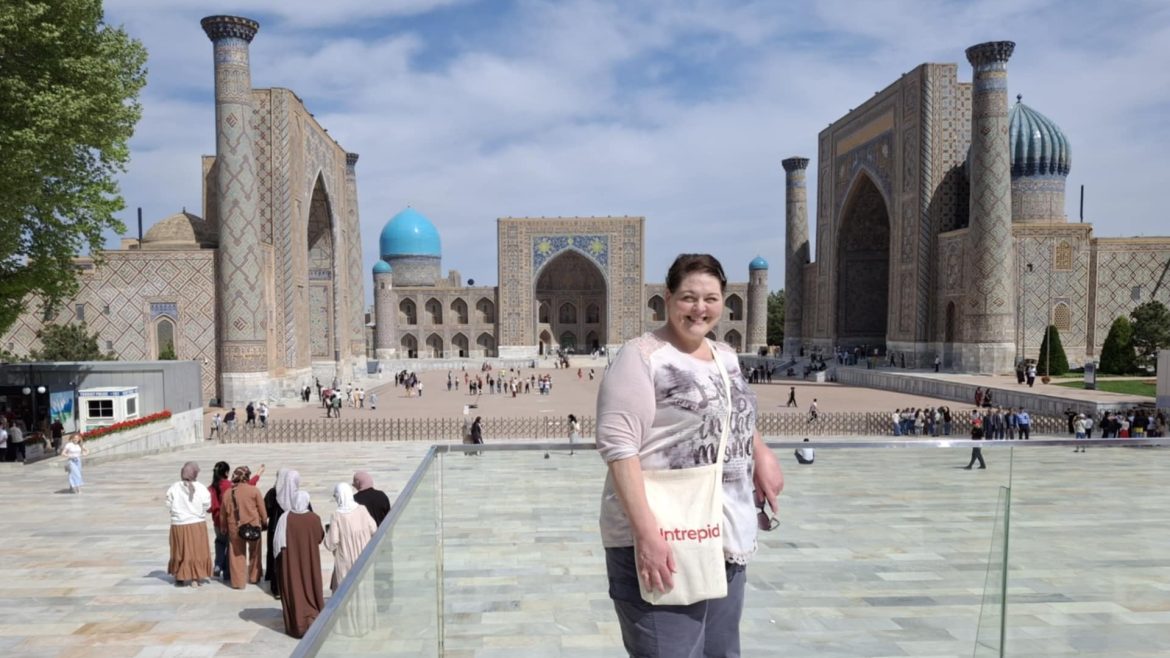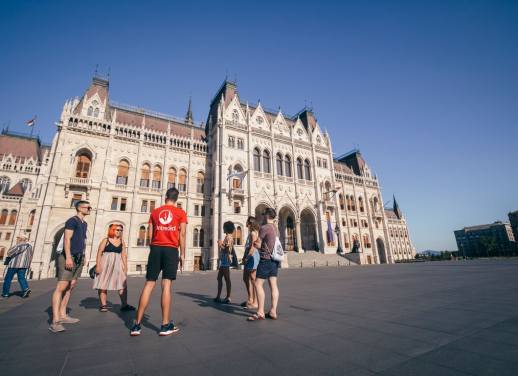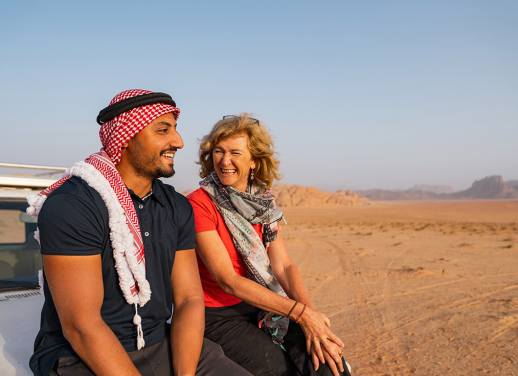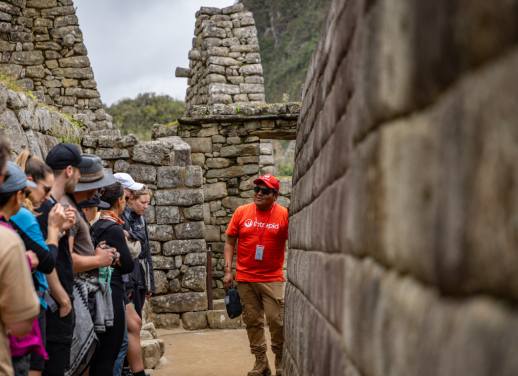Intrepid traveller Carla isn’t one to shy away from a challenge. But after years of dealing with the fatigue and weakness that comes with long Covid, she didn’t need another achievement ticked off the list. She just wanted to feel like herself again.
It was such a small thing.
I was sitting on the Old City wall in Khiva, Uzbekistan, watching the sunset. The heat of the day was dissipating, and I was watching some of the local kids aim a soccer ball at an imaginary goal post. I was a few days into Intrepid’s Central Asia: Five Stans Express trip, taking a quiet moment to myself to stop, breathe and drink up my surroundings.
I scanned the horizon from my perch, having just climbed a short but steep set of stairs up onto the wall. For the average person, it was a feat of ‘nothingness’. But for me, it was a small triumph, a quiet win and a relief. ‘Look at you, legs… look what you just did.’
The long road back from long Covid
People aren’t worrying about Covid-19 too much these days, but for some of us, it’s ever-present. I developed long Covid in 2022, after contracting the virus for the second time. Besides the foggy memory and myriad other annoyances, I lost complete feeling in my toes and developed a debilitating weakness in my legs. These symptoms started about three weeks after I had recovered from the acute infection. At first, I thought I just needed more rest, or to eat better, but nothing helped in the slightest. I simply grew weaker and weaker and weaker.
My legs had always been the strongest part of me. They hiked me over mountains in Romania, up to the monastery in Petra and over Dead Woman’s Pass on the Inca Trail. But, for a year and a half, those same legs couldn’t get me around a supermarket. Sometimes I was unable to stand up from a chair, other times they collapsed without warning and I would fall to the ground.
The journey through long Covid isn’t for the faint of heart. Healing isn’t linear. ‘Crashes’ (the sudden and severe drop in physical or mental energy experienced by many sufferers) can happen at the most inopportune times and would leave me bedridden. I quietly wallowed in despair; there’s an abject loneliness that comes from being unable to participate in community. Before long Covid, I went for daily walks on the beach or through my local park, volunteered on multiple boards and attended concerts and festivals. But all of this had slipped away.
One of my biggest fears was that I would never travel again. If I couldn’t get up the stairs in my own house, how was I going to be able to get around an airport, let alone a foreign country?
Read more: The road to Machu Picchu starts at 385 lbs
A turning point
In 2024, things finally started to improve. I could take small walks. By small, I mean from the parking lot to the beach and back. And then to the water’s edge and back. Maybe 100 paces. It wasn’t hiking in the Andes, but it was something.
Then, one day, I was scrolling on Facebook when the Five Stans trip popped up in my feed. I scrolled past it initially, then backed up. You know, I didn’t even want to click on it. I didn’t want to get my hopes up and dream of travel, just to deny myself the privilege. But I clicked.
Turkmenistan! Are you kidding me? SOLD!
For decades before the word Covid even existed, the Stans had been a bucket list trip for me. I’d been poring over books about the Silk Road for years, reading about this ancient trade route that was steeped in human history. My soul had been harassing me to go to Central Asia. To be there, walking in the footsteps of Genghis Khan, imagining the 1000-camel caravans pulling into Samarkand, would be a true Carla-esque adventure.
So, did I have the legs to do it? Honestly, in many ways, it was a huge gamble.
Read more: 78 reasons to book the damn trip


From fear to freedom
On my first night in Turkmenistan, I remember lying in bed and thinking, ‘just 25 more sleeps until I can go home.’
The thought came from a place of fear and uncertainty. The 44-hour journey from my hometown in Nova Scotia to Ashgabat had knocked the stuffing out of me. I felt exhausted and worried – not just about my own ability to complete the trip, but about dragging the group down with me.
Long Covid is unforgiving if mismanaged. Appropriate rest, nutrition and hydration are paramount. It’s hard to stick to a routine when travelling, so there were a few days where my legs decided that they were not going to do what everyone else was doing. After a morning of hoofing it around town with the group, I chose to take the afternoon for my own adventure – one where I could walk as much, or as little, as my legs would allow. This is one of the things I love about Intrepid trips; itineraries often include free time and alternative activities suited to different abilities. Even when I travelled with Intrepid before long Covid, I would break away from the group to soak up the vibe on my own terms. But now, it was not only necessary, it was healing.
On leg crash days, I found my bliss in quiet corners, reminding myself that I may just be chilling in a cafe, but it was still a cafe in Kazakhstan! This was my saving grace: simply having time to stop.
I spent an evening sitting in a park in Bukhara, watching groups of women laugh with each other under the setting sun. I walked among minarets and madrasas at my own pace and soaked up the details that faster-moving folk may miss. I explored the little Tajik village of Sary-Tag and communed with cows. One night I went to bed at 6 pm and dozed as a worker stoked my little stove with cow dung to keep me warm at a yurt camp in the Karakum Desert. These small rests and adjustments buoyed me enough to get me through five countries.


Final destination: feeling like me again
At home, weeks earlier, when the departure date for this trip was drawing near, friends would ask me if I was getting excited. I always said ‘no’. In fact, I had atypical feelings about going. Everything from nervousness to complete dread. I think that people with chronic illness have a hard time feeling positive about anything associated with ‘future’ plans, because there’s no guarantee that our bodies will cooperate.
But, then, in a flash, I was on the final stretch of the trip and had, thankfully, experienced very few bumps in the road (besides the literal ones – I’m looking at you Ashgabat to Uzbekistan!). My legs, plus a strong sense of curiosity and sheer will power, had allowed me to walk 20,000 steps on city tours, climb the hill at Darvaza crater, clamber my way up out of Charyn Canyon and explore the villages of Tajikistan, despite the altitude. This simply couldn’t have happened 12 months prior.
On our last day, I left the group at a restaurant, saying quick farewells. I felt emotional and needed to take myself for a little walk. The sun was setting, the streets of Bishkek were bustling with the comings and goings of Kyrgyz, and I had ‘that’ moment. That moment when things are coming to a close and the epic adventure that was once sprawling out in front of you is coming to an end. A wave of gratitude stopped me in my tracks, imprinting itself in my memory. For the first time in a long time, I felt like myself.
I thought about how I had wished it all away in Turkmenistan a month prior, driven by dread. And now, here I was, with tears streaming down my face and a lump in my throat. I had done it. Thrived it and survived it.
I’ve heard many people say that they ‘find themselves’ while travelling.
But me? I remembered myself.
…and that is no small thing.
Carla travelled on Intrepid’s Central Asia: Five Stans Express trip.




